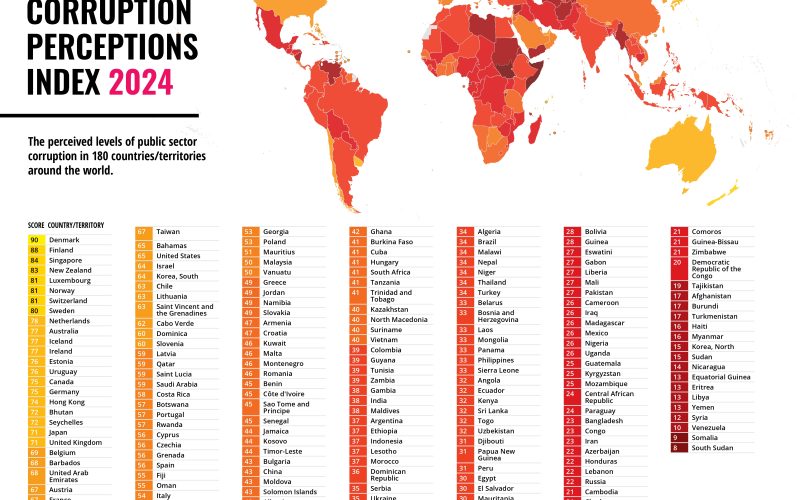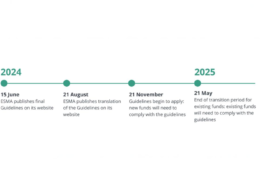Corruption levels across the globe remain alarmingly high, with little progress in tackling the issue, according to the 2024 Corruption Perceptions Index (CPI) released by Transparency International. The report reveals that more than two-thirds of countries scored below 50 out of 100, with the global average stagnating at 43, underscoring corruption as a critical barrier to effective governance and climate action.
Amid worsening climate change, record-breaking global temperatures, and declining democratic governance, corruption is making the fight against the climate crisis increasingly difficult. The CPI highlights the strong connection between corruption and climate policy failures, warning that unchecked corruption is obstructing urgent action.
Many nations central to international climate efforts—including hosts of the United Nations Climate Change Conference (COP)—have low or declining CPI scores. This trend reflects how corruption weakens climate diplomacy, enabling undue influence from oil and gas lobbyists, which was particularly evident at recent COP summits.
Transparency International warns that billions of dollars in climate finance are at risk of being stolen or misused, with corruption hindering essential climate projects meant to protect vulnerable communities. Countries most affected by climate change often have some of the lowest CPI scores, including South Sudan (8), Somalia (9), and Venezuela (10).
The report details how corruption threatens efforts for a just transition to net zero. In countries such as South Africa (41), Vietnam (40), and Indonesia (37), weak governance structures have created opportunities for exploitation.
In South Africa (41), an estimated billion rand (over $56 million) is stolen each month from Eskom, the state-owned energy provider, highlighting governance failures in the country. In Somalia (9), corruption has exacerbated the impact of climate change on the nation’s agricultural economy while fueling its 30-year-long conflict.
The CPI report also exposes corruption within nations responsible for global climate negotiations, raising concerns about the credibility of multilateral climate agreements. Azerbaijan (22), host of COP29, granted access to at least 1,773 fossil fuel lobbyists, raising concerns over corporate influence on climate talks. Brazil (34), host of COP30, must secure $1.3 trillion in climate financing by 2035 but has hit an all-time low CPI score, sparking fears over financial mismanagement. South Africa (41), set to host the G20 Leaders’ Summit, has dropped three points since 2019, further highlighting governance challenges.
Nations with high CPI scores are not immune to corruption’s impact on climate policy. Some of the wealthiest countries, including the United States (65), Canada (75), and New Zealand (83), have declining scores, indicating growing influence from industries obstructing emissions reduction efforts.
Environmental defenders—activists and community leaders fighting for climate justice—are increasingly targeted. Since 2019, almost 1,013 land and environmental defenders have been murdered, with nearly all killings occurring in countries scoring below 50 on the CPI.
The CPI ranks 180 countries and territories on a scale from zero (highly corrupt) to 100 (very clean). The latest findings indicate that corruption remains a significant global issue, with widespread governance failures affecting billions of people.
A staggering 85% of the world’s population—approximately 6.8 billion people—live in countries with CPI scores below 50, highlighting the prevalence of corruption in most regions. These findings suggest that the vast majority of the world’s citizens are impacted by weak governance, lack of transparency, and systemic corruption.
Among the least corrupt nations, Denmark (90) remains at the top of the rankings, maintaining its position as the world’s cleanest country in terms of corruption. It is closely followed by Finland (88) and Singapore (84), which continue to demonstrate strong governance and public sector integrity.
At the opposite end of the spectrum, the most corrupt nations are largely those experiencing conflict and political instability. Countries such as South Sudan (8), Somalia (9), Venezuela (10), Syria (12), Libya (13), Yemen (13), and Equatorial Guinea (13) rank at the bottom, reflecting extreme levels of corruption, weak rule of law, and widespread governance failures.
A worrying trend identified in the 2024 CPI is the record-low scores in 47 countries, including Austria (67), Brazil (34), France (67), Mexico (26), Russia (22), and the United States (65). These declines point to increasing concerns about corruption and transparency issues in both developing and developed nations.
However, there have been some notable improvements. Seven nations have significantly raised their CPI scores over the past five years, showing progress in tackling corruption. These countries include Côte d’Ivoire (45), the Dominican Republic (36), Kosovo (44), Kuwait (46), the Maldives (38), Moldova (43), and Zambia (39), reflecting stronger anti-corruption measures and governance reforms in these regions.
Conversely, 13 countries have seen the sharpest decline in their CPI scores over the past five years, with Austria (67), Belarus (33), Belgium (69), France (67), Myanmar (16), the United Kingdom (71), and Venezuela (10) among those registering the most significant drops. These declines suggest growing concerns over corruption, governance challenges, and weakening democratic institutions in various parts of the world.
Transparency International warns that without greater transparency, stronger accountability measures, and more political will to tackle corruption, both democracy and global climate ambitions will continue to be undermined. The upcoming COP30 in Brazil and the G20 Summit in South Africa present key opportunities for global leaders to address the corruption crisis and prevent it from further derailing climate progress.
François Valérian, Chair of Transparency International said, “Corruption is a growing global threat, fueling democracy’s decline, instability, and human rights violations. Tackling it must be a long-term priority for every nation to counter authoritarianism and ensure a peaceful, free, and sustainable world. This year’s Corruption Perceptions Index reveals dangerous trends that demand urgent action.”
Maíra Martini, CEO of Transparency International said, “Corruption threatens meaningful climate action. Governments and international bodies must embed anti-corruption safeguards into climate policies to protect funds, restore trust, and drive real impact. Corrupt forces manipulate policies, silence activists, and erode accountability. True climate resilience requires confronting these threats head-on.”





















